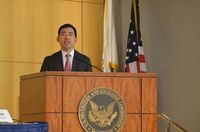On March 21, 2025, the Securities and Exchange Commission (SEC) convened its first roundtable meeting to address pressing issues in the cryptocurrency space, with a clear intention to establish effective regulations. Commissioner Hester Peirce, who heads the agency’s crypto task force, emphasized during the session the eagerness of the SEC staff to collaborate closely with the crypto sector in formulating oversight policies for digital asset transactions.
In her opening remarks, Peirce stated, "I think we are ready for the spring that lies ahead," referring to the roundtable’s theme, "Spring Sprint Toward Crypto Clarity." Her comments reflect the agency's commitment to simplifying the complex landscape of digital currencies, asking, "Can we translate the attributes of a security into a straightforward taxonomy that encompasses the many different types of crypto that exist today and could exist in the future?"
Mark Uyeda, acting chairman of the SEC, reiterated that while certain aspects of the crypto industry—such as memecoins and mining—are not currently classified as securities, there exists a possibility for others to be defined as such. "It is certainly possible that additional areas will be deemed securities," he remarked in response to inquiries from CoinDesk, addressing the regulatory confusion that has plagued digital assets.
Uyeda underlined the SEC’s willingness to consider public discussions as indicative of the agency's overall direction, especially as it aims to provide clarity to participants in the crypto market. He pointed out that the panel's insights were reflective of the full commission, currently comprised of three members, as they explore how regulatory interpretations might evolve.
At this inaugural roundtable, around a dozen lawyers specializing in cryptocurrency offered their perspectives on the unique challenges they face when guiding companies through the complexities of regulatory compliance. Sarah Brennan, general counsel of Delphi Ventures, provided a critical view on the implications of securities law, stating, "The specter of enforcement of securities laws has pushed early-stage projects into a trajectory very similar to initial public offerings (IPOs), where they remain private for extended periods." She emphasized how traditional business models, once designed for broader, immediate market access, are now heavily influenced by stringent regulatory expectations.
Concerns regarding the actual utility of many cryptocurrencies were raised by John Reed Stark, a former SEC lawyer. Speaking to the group, he noted, "If everything were to end tomorrow and it was just speculation, would it even matter?" Stark’s comments reflect an ongoing worry that the crypto market lacks substantial practical applications, a sentiment echoed by various experts in the field.
Prior to the roundtable, lawmakers Sen. Elizabeth Warren and Rep. Jake Auchincloss, both from Massachusetts, sent a letter to Uyeda inquiring about the SEC's staff statement regarding memecoins. Their letter posed significant questions: Had there been any communication between the SEC and the White House regarding this statement? Why was this staff declaration not incorporated into a more formal regulatory process?
Warren and Auchincloss specifically pushed for clarification on how the SEC defines memecoins and how these differ from broader cryptocurrency categories. They demanded insights into which memecoins had been analyzed by the SEC in formulating its statements on regulatory approaches.
The SEC's recent endeavors to engage with the cryptocurrency industry come at a time when the need for clarity and comprehensive regulation has never been more critical. With a growing array of digital assets hitting the market daily, both regulatory bodies and agencies must adapt to the rapid demographic shifts within this emerging sector.
As for the future, the roundtable marks a pivotal step toward bridging the gap between innovation in the crypto space and the necessary regulatory frameworks. With the SEC demonstrating a willingness to listen to industry experts and learn from their experiences, positive outcomes in the form of clear and effective regulations on cryptocurrencies could follow.
In a sector where uncertainty often reigns, stakeholders eagerly anticipate how the SEC’s efforts will shape the future of digital asset regulations. Many in the industry hope that collaborative dialogues such as the recent roundtable signal a proactive strategy to navigate the challenges posed by existing laws.
This interaction between regulators and the crypto sector is essential for fostering an environment where innovation can flourish while ensuring that investor protections remain intact. As conversations around crypto regulation evolve, it is critical for lawmakers and regulators to stay engaged with the dynamics of technology and finance to create a balanced approach that promotes growth and stability in the market.



